Turn Website Into App – The Ultimate Guide (2024)

Creating a mobile app is the best way to take your website to the next level.
While websites are fine for computer browsing, 85% of people say they prefer mobile apps over mobile sites on smartphones. Mobile app users prefer the convenience, user experience, and speed of apps compared to websites. This gives you an opportunity to target a wider audience and generate more conversions.
So how do you turn a website into an app? This guide will show you how.
We’ll start by covering the main advantages of mobile apps compared to websites and web apps. Then you’ll discover the different ways to convert a website into an app and follow our step-by-step blueprint for success.
Benefits of Mobile Apps vs. Websites
Why should you turn your website into a mobile app? Here are the top reasons:
Create a Mobile App for FREE with BuildFire
Ease of Access
Let’s do a quick experiment.
Take out your phone, and navigate to your website. How long did that take? You had to open your phone, navigate to a web browser, and then type in your site address (hoping not to make any spelling mistakes on a small screen).
Now open any app on your phone.
Obviously, it’s much faster to open an app than it is to visit a website. When you turn your site into an app, you’ll always be just a click away from anyone’s smartphone or tablet.
Push Notifications
Push notifications offer a significant communication advantage over websites.
For websites to communicate with visitors, you need to rely on email opt-ins. Even if you manage to get subscribers, your next battle is getting them to open your email marketing campaigns—which is a completely different ballgame.
But push notifications go directly to a user’s home screen, similar to a text message. So you can communicate with app users at any time, keeping your brand top-of-mind for any campaign or goal.
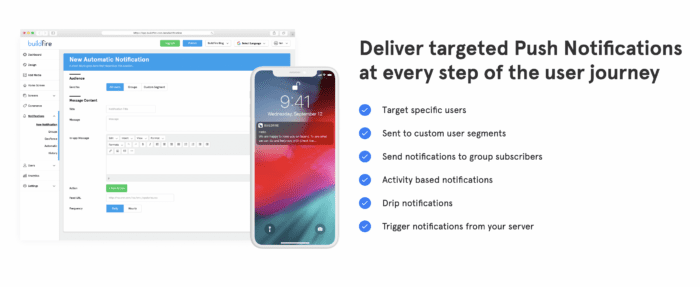
Loyalty
Mobile apps typically drive more loyalty compared to websites. That’s because apps live on a user’s home screen. They’re much more inclined to open a mobile application if they’re staring at your app icon dozens of times per day.
When you consider the fact that the average person picks up their phone 58 times daily, it drastically increases the chances of your app being used as well.
Apps also make it easier for you to create customer loyalty programs, encouraging users to spend more money and convert more frequently. Then they can track their loyalty rewards progress directly from the app.
Engagement
Apps provide a more pleasant experience for users compared to the mobile web. This translates to more engaged audiences.
If your site isn’t loading quickly or there isn’t a seamless navigation between screens, people often get frustrated and bounce. But native apps tend to perform much better, which translates to people having longer sessions and completing more in-app actions.
You can also monitor user engagement statistics and tweak your app accordingly to ensure users open the app more frequently. They’ll continue having long, engaging sessions.
Conversions
Mobile apps convert higher than the mobile web.
This isn’t just an opinion or an observation—there are hard numbers to back this up. Just look at these app conversion rate differences between mobile apps and mobile sites:
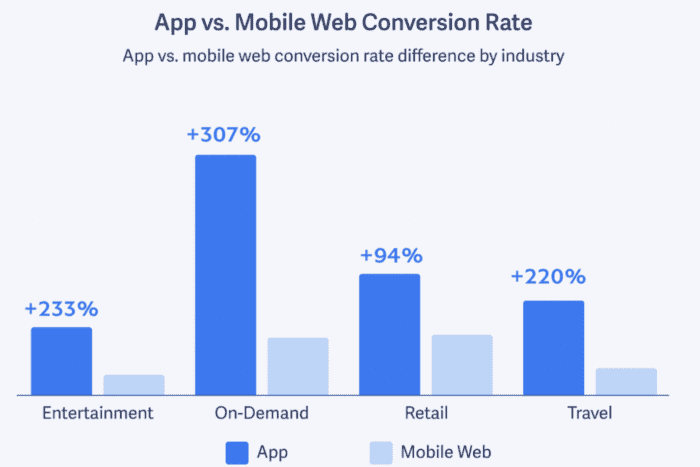
Mobile applications perform higher in every industry. On average, apps convert at a 157% higher rate compared to mobile sites.
Imagine getting a 150% increase in conversions simply by creating a mobile app. That alone should be a good enough reason to move forward.
Meet User Expectations
People want to do more from their mobile devices. This includes everything from mobile banking to online shopping, scheduling appointments, watching videos, and reading blogs.
Imagine trying to find a business online, only to discover they don’t have a website. You’d be shocked, right?
While you wouldn’t quite have the same reaction to them not having an app, you’d still be a little surprised. Brands having mobile apps has become the new normal. We’re reaching the point where not having a mobile app is almost like not having a website.
Improve the User Experience
Apps provide a better user interface and user experience compared to mobile sites in almost every way. That’s because mobile apps can use native device features, including cameras, Bluetooth, photo reels, contact lists, and more.
Mobile apps are made specifically for mobile devices, whereas websites are generally designed for larger screens.
Obviously, having a mobile version of your website improves the user experience. But it’s not quite to the same extent of having a fully native mobile app.
Generate More Revenue
Apps give you the opportunity to make more money.
You can either use your app as a way to generate revenue using your existing business model or potentially open up new revenue streams. For ecommerce apps and subscription services, having an app is an absolute must.
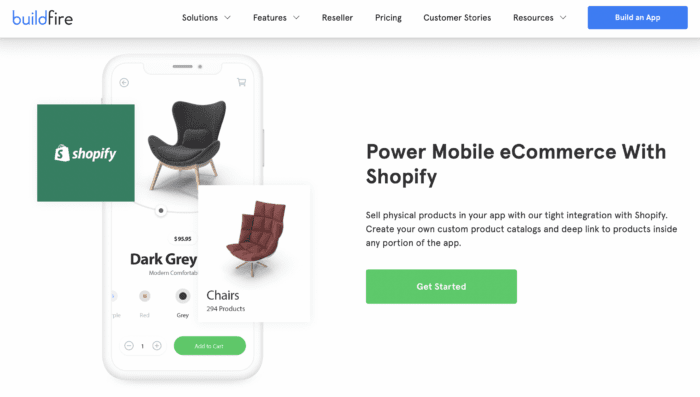
But even content creators can generate new revenue by offering in-app purchases to premium content or making in-app advertisements.
You can use your app to book appointments, sell tickets, manage events, and even collect deposits as well. The opportunities are seemingly endless.
App Store Presence
Having an app gives you an opportunity to expand your reach. Right now, you might only be reaching people who follow your brand on social media, read your blog or discover you through an organic Google search.
But you’re neglecting all of the potential users who are browsing the Google Play Store to find an Android app and the Apple App Store to discover new iOS apps.
According to a recent study, 48% of people say they find new apps by browsing app stores. An additional 34% of users say they find new apps through app store recommendations.
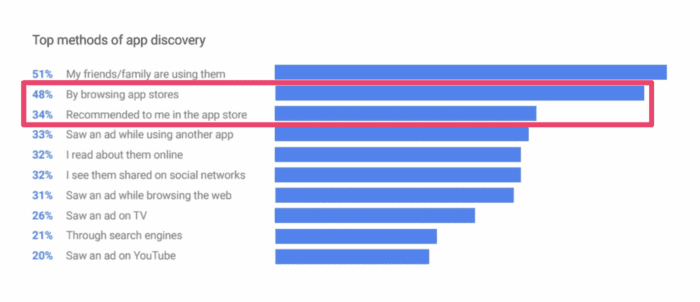
These are both two of the top three app discovery methods.
By having your app available to download on additional channels, you can attract an entirely new audience to your brand.
Competitive Advantage
Creating an app gives you an opportunity to stand out from the crowd. There are two ways to look at this.
One, if your direct competitors don’t have an app just yet, then you can beat them to the market and gain a significant advantage. Depending on the situation, you might even be able to steal their customers. Two, if your competitors already have an app, then you definitely need an app to keep up with them and stay relevant.
Users could look at your brand and think that you’re not modern or keeping up with the times if you don’t have a mobile app.
Offline Support
Mobile sites and website apps have a major flaw—they need internet access to work. So if someone is on the go and can’t connect to a WiFi network, they won’t be able to access your website without using cellular data.
But mobile apps work offline, meaning they’re always available to users.
You can also set up your app to have offline-specific features. For example, look at an app like Google Docs. People can’t save changes to documents without an internet connection. But they can make changes and have everything saved to their mobile device. Then as soon as they get an internet connection, the files will be moved and backed up to the cloud.
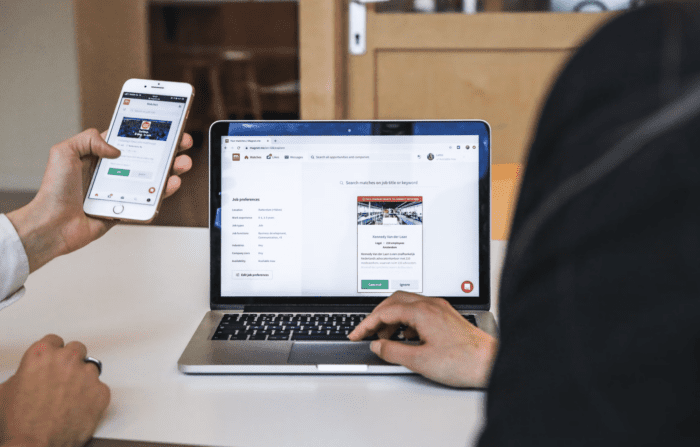
6 Ways to Convert Your Website Into a Mobile App
There are lots of different ways to convert your website to an app. But not all of these options are great. We’ll cover each one in greater detail below so you can discover the best solution for your situation.
Use a Website to App Conversion Platform
Lots of tools on the market make it easy to create apps from a website. However, many of these conversion platforms are extremely limited. They’re essentially taking your existing website and just repurposing it into a mobile version, and that’s not what you want.
A mobile app should have distinguishably different features from your website. Your app could actually be rejected from the Apple App Store if it’s too similar to your site.
Most of these platforms don’t support custom features, and you can’t even send push notifications or do other basic actions.
Pros
- Cheap
- No coding required
- Get app to market quickly
Cons
- Limited features
- No custom capabilities
- Can’t connect to native APIs
- Not distinguishable enough from your website
- Limited room for scale and growth
Overall, this option is really only viable for smaller websites on an ultra-tight budget. You want an app for the sake of having one but don’t really care about making money with it or getting lots of downloads.
Get Started With BuildFire Today!
Pick a template to start designing the app yourself, or let our professional design team build it for you.
- Mobile app development for iOS & Android
- No coding required
- 150+ pre-built features
- Unlimited customization
- 14 day free trial

Code the App Yourself
If you’re tech-savvy and want to create your own app without hiring anyone or using a third-party platform, you could always code it by yourself. But for most people, this obviously involves learning a completely new skillset.
Learning how to code is not easy. Even after you nail some of the basic concepts, your first handful of projects probably won’t be amazing. Do you really want to experiment by building a native app from your website?
For business use cases, the answer is almost always no.
Pros
- You have full control over every detail
- No need to hire other developers
- Cheap
- Complete customization options
Cons
- Longer development timeline
- Must learn how to code
- Final product is likely to have some flaws
- Need to maintain all of the backend infrastructure on your own
If you have some basic coding knowledge and you don’t mind experimenting, this could work for you. Maybe you even did all of the coding for your website, and you want to transition those skills to a mobile app. But for the vast majority of people, learning to code probably isn’t the best path for converting a website to an app.

Hire a Freelancer
Hiring freelance mobile app developers is an appealing option to many people. That’s because freelancers are often a cheap way to create native apps. There are plenty of freelance job boards and platforms to connect you with developers from all over the world.
Risk is the biggest downside associated with hiring a freelancer. Your success and failures fall solely into the hands of a single person.
What happens if the project gets delayed? What if they get sick? How will you handle things if they’re not responding to calls or messages?
Language barriers can also be challenging, especially when you’re working with international developers.
Pros
- Cheaper than an app development agency
- You don’t have to code anything on your own
- Thousands of developers to choose from
Cons
- Difficult to vet developers and find the best person for your project
- Need to get the freelancer to understand your vision and business goals
- Lots of back and forth communication is required
- Costs can get out of control if there are any delays
Check out our guide that compares app development companies vs. freelancers for more information. If you know you want to outsource the project but don’t have the budget for a US-based development company, a freelancer could be a good option if you’re willing to take some risks.

Hire a Development Agency
Outsourcing your website app project to a development company is almost always a better option than going with a freelance developer. The costs will usually be a bit higher, but the final product and complete development option are usually worth it.
With an agency, you’ll have a complete team of experienced developers and designers at your disposal. This means your app will get to market faster, and the final product will be superior to other options.
Most development agencies will also walk you through other key parts of the app development process, like wireframing, design, and post-launch support.
Pros
- Complete customization
- Get your app to market fast
- Entire team working on your project
- Some agencies specialize in niche-specific apps
Cons
- Most expensive option
- Some agencies have strict contract terms
App development agencies can be amazing. Just don’t expect them to be cheap.

Use an App Builder Platform
An app development platform makes it possible to create an app on your own without writing a single line of code. Many of you might be familiar with this concept if you used a website builder like Wix or Squarespace to launch your website.
These tools are designed for DIY users that want to keep costs low and still have an excellent final product.
There’s definitely some work to do on your own, but it’s usually not very challenging. You can start with a template and just customize everything else from there with your branding and content.
Pros
- Affordable
- No need to outsource
- Start with a template
- Control everything on your own
Cons
- Not every app builder offers custom solutions
- You may need to test different tools to find the best one for your needs
- Some app builders aren’t built to scale
Just be aware that not every app builder is the same. Some have stricter limitations on what you can build and how much you can customize. Other options are good for post-launch features like unlimited push notifications.
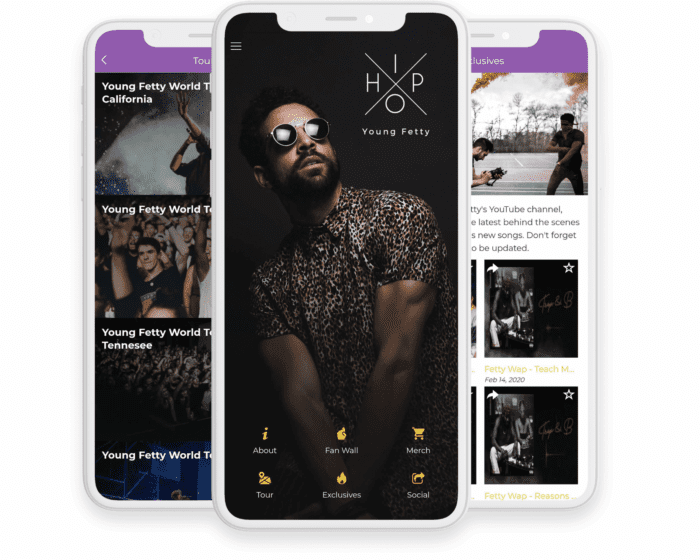
Use BuildFire
BuildFire is the best way to convert your website into an app. It’s an app maker platform with custom development services under one roof—providing a solution for everyone, regardless of your goal or budget.
For DIY users, you can use BuildFire’s app builder to convert your website to an app with ease. Our drag-and-drop platform has virtually no learning curve, and you can start building today. Adding features is easy. Just find what you’re looking for in our feature marketplace, and you can add it to your app with a single click.
Compared to other app builders, BuildFire stands out with its limitless scalability and functionality. Even for DIYers, our team can provide assistance and create custom features uniquely for your app. That’s the value of app development services vs. stand-alone app builders.
If you want to completely outsource the project, we also offer a fully custom app development service that includes planning, design, development, updates, and post-launch maintenance.
Pros
- Build iOS apps and Android apps simultaneously
- No coding required
- Affordable alternative to traditional development
- Limitless scalability
- Fully customized features and development solutions
- App builder and development services under one roof
- One-click publishing to Apple App Store and Google Play Store
Cons
- Not ideal for gaming apps
- Not ideal for VR or AR apps
BuildFire has been used to create more than 10,000+ mobile apps. Sign up for a 14-day free trial to get started, or schedule a free consultation to learn more about our custom development solutions.
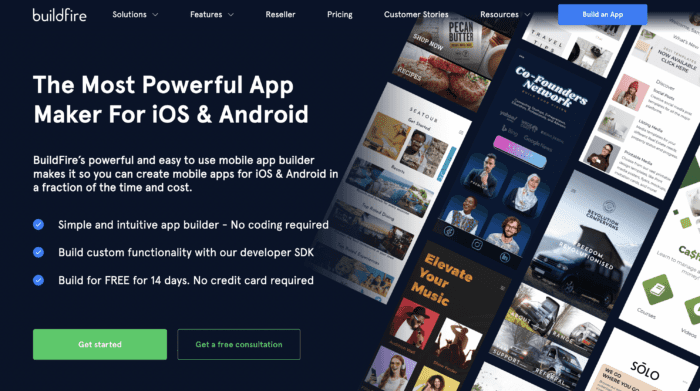
How to Convert a Website to a Mobile App in 7 Steps
Now let’s look at the exact steps required to turn your site to an app. The entire process can be summarized in seven simple steps.
Step 1 — Verify the Need for a Mobile App
The first thing you need to do is make sure there’s actually a market need for your app. In some cases, having a website alone could be fine for your situation.
Let’s say you’re just starting off with a small personal blog right now. If you’re on a really tight budget, you might consider growing your blog organically before taking the plunge into mobile development. Creating mobile apps does involve some time and money. So if you’re not ready to commit, then it’s probably in your best interest to wait.
You should also do some market research to make sure your app will offer something that people actually want or need. This will also help you stand out from your competitors.
Step 2 — Brainstorm Features For Your App
Now you need to take some time and think about your app features. Instead of focusing on the features first, you can start by brainstorming functionality.
What problems will your app solve? How will your app be different from your website?
Remember, the app needs to be distinguishably different from your mobile site to be accepted by the app stores. You can’t just reformat the same content and put it into an app.
While your initial list of features might be long, you’ll eventually want to narrow that list down to a shortlist of features that support your app’s primary purpose. Start with those features, and you can always add more down the road.
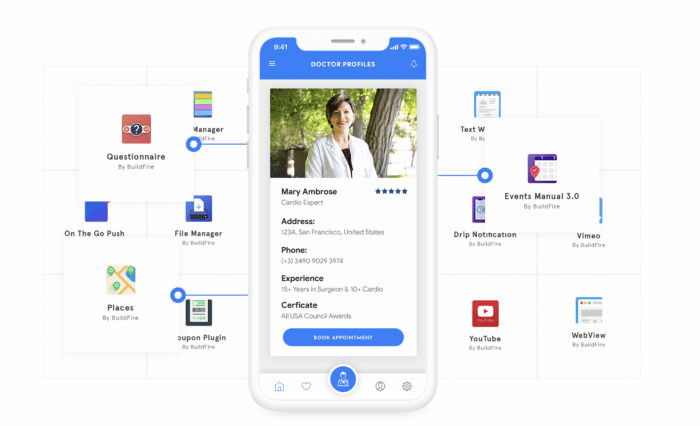
Step 3 — Determine Your Budget
Take a look at your finances. How much money are you able to spend on an app?
The answer to this question will be really important when you get to the next step, and it also plays a significant factor in your app’s features.
Generally speaking, complex apps with lots of features will be more expensive to build. But if you’re just creating a simple app with slight variations from your website, you can probably get away with spending significantly less.
For example, BuildFire’s app development platform starts at just $159 per month.
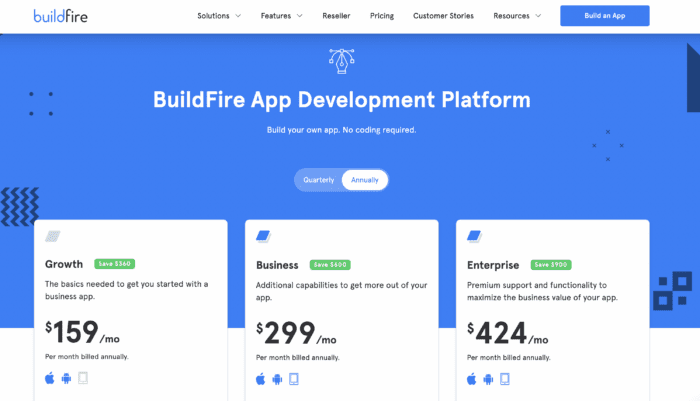
This is a cost-effective alternative to traditional development, which can cost upwards of $100,000 or more.
Step 4 — Choose Your App Development Method
Based on your goals, budget, and technical capabilities, it’s time to select an app development method. Here’s a quick summary of the options we discussed earlier for creating mobile apps:
- Website to app conversion tool
- Code the app on your own
- Hire a freelancer
- Higher a development company
- Use an app builder
- BuildFire
Refer to our full guide on how to make an app for more information on different app development solutions. You can also get a free copy of our Buyer’s Guide for Mobile App Platforms ebook.
Step 5 — App Design
Once you’ve chosen a development method, it’s time to start thinking about your app design.
There are a couple of different options to consider here. First, you can simply sketch out the UX/UI design on your own before passing it off to an app designer. Alternatively, you can start with a template and customize everything on your own.
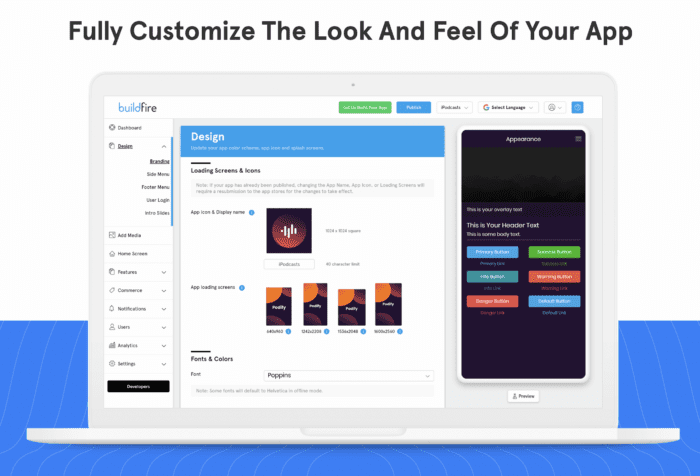
With BuildFire’s app builder, you don’t need to hire a designer or pass the project off to a design team. You do it all on your own. Check out our app design resources for inspiration, tips, and best practices.
If you don’t want to design the app by yourself, that’s fine too. We also offer full-service design and development.
Step 6 — Testing
Testing is something that you should do in stages throughout the development process.
The best testing options depend on your development method. If you’re outsourcing the project to a development team, they’ll likely handle all of the testing on your behalf.
Making sure your app functions the way it’s supposed to without any bugs, glitches, or crashes is crucial—especially when you first launch. If your app doesn’t make a good impression on your audience, they likely won’t come back and use it again. But on the flip side, a great first impression helps ensure that the user will continue using your app again and again—allowing you to drive engagement and conversions.
Step 7 — Prepare for the App Stores (Apple App Store for iOS and Google Play for Android Apps)
Start thinking about how your app is going to look and appear in the app stores. Just know that your iOS app has different guidelines from Android apps.
Each app store has unique rules and submission guidelines that you need to be aware of.
Our complete guide to app store optimization (ASO) will help steer you in the right direction. If you use BuildFire to create your app, we’ll also help get your app published. You just need to make one click, and we’ll handle the rest on your behalf.
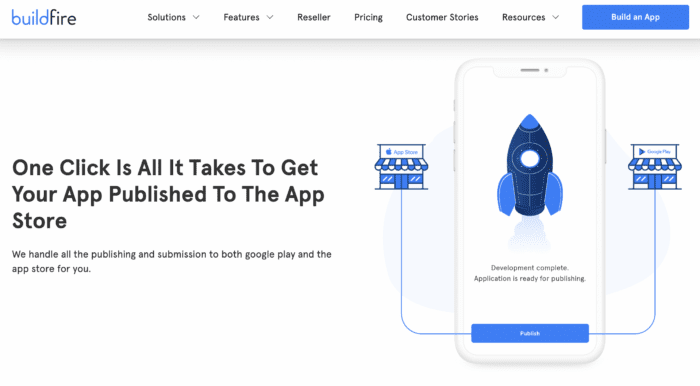
Turn Website Into App — Final Thoughts
Ready to turn your website into a mobile app?
Sign up for a 14-day free trial of BuildFire. It’s the easiest and most powerful way to create an app for iOS and Android—no coding or technical skills required. Alternatively, you can let our team handle all the design and development for you with our all-inclusive app design and development services. Schedule your demo to learn more.